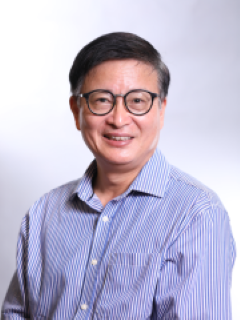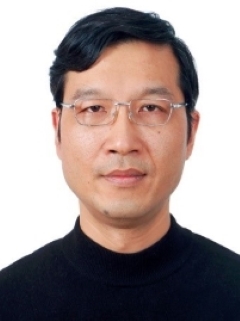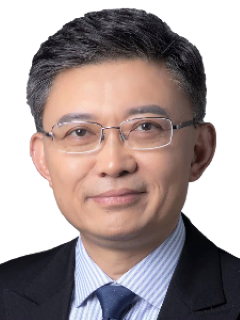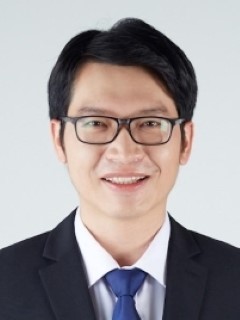Keynote Speakers

Prof. George Q. Huang
Hong Kong Polytechnic University
George is Chair Professor of Smart Manufacturing at Department of Industrial and Systems Engineering, The Hong Kong Polytechnic University. Prior to this appointment, he was Chair Professor of Industrial and Systems Engineering and Head of Department in Department of Industrial and Manufacturing Systems Engineering at The University of Hong Kong. He gained BEng and PhD in Mechanical Engineering from Southeast University (China) in 1983 and Cardiff University (UK) 1991 respectively. He has conducted research projects in areas of Smart Manufacturing, Logistics, and Construction Systems Analytics through IoT-enabled Cyber-Physical Internet with substantial government and industrial grants. He collaborated closely with industries through joint projects and start-up companies. He has published extensively and his works have been widely cited by research communities. He serves as associate editors and editorial members for several international journals. He is Chartered Engineer (CEng), Fellow of IEEE, IISE, ASME, CILT, HKIE, and IET.
Keynote Title
Smart Fashion Social Manufacturing with Industrial Large Model
Keynote Abstract
The industrial sector of garment and fashion manufacturing is quite special. Materials are soft and flexible, lead times are highly compressed and very short, order variety and volume could range widely. Customers and markets, fashion designers and tailors, production facilities, and logistics and deliveries are geographically distributed. These characteristics demonstrate a strong case not only for Industry 4.0 smart social manufacturing but also for Industrial Large model. This talk will share recent efforts in developing ChatCustomers, ChatTailor and ChatFactory which utilize large model, social manufacturing and Industry 4.0 technologies for fashion production.

DR. Cungen Cao
Chinese Academy of Sciences
Dr. Cungen Cao received his PhD degree from the Chinese Academy of Sciences in 1993. Since 2000, Dr.Cao has been a professor of Institute of Computing Technology, Chinese Academy of Sciences. He has led a research group to build a large-scale knowledge base for supporting knowledge-intensive applications. Dr. Cao has published 130+ papers and 3 books. He is currently on the editorial boards of Frontiers of Computer Science and Computer Science.
Keynote Title
Constructing and Reasoning over an Event Knowledge Graph
Keynote Abstract
This presentation introduces our latest work on event knowledge graphs. First, I introduce a manually crafted seed event knowledge graph in Chinese, consisting of events and their relationships; a deep learning model for labelling semantic roles in the events. Second, I present an LLM-based method for expanding the seed event knowledge graph. Third, with the aid of the semantic roles in the events, all events in the graph are translated into first-order predicates, and the event graph is translated into Prolog rules. Finally, under the SWI-Prolog environment, automated inference can be conducted over the event knowledge graph.

Prof. Yun Li
University of Electronic Science and Technology of China
Professor Yun Li FIEEE taught at University of Glasgow for 28 years, where he was recognized as the second Top Author and served as the founding Director of University of Glasgow Singapore. Since 2021, he has been Director of Industrial Artificial Intelligence Centre at Shenzhen Institute for Advanced Study, University of Electronic Science and Technology of China. Inspired by AI, his early work resolved issues in PID control that had puzzled practising engineers for over 50 years. He has published over 300 papers and books, and holds over 20 patents in China, Europe, United States and Japan. He has led or co-led over 30 research projects in the UK, EU, Singapore, and China, equivalent to over 20 million pounds in funding. Currently, his leads 2 major research projects funded by the National Natural Science Foundation of China for the next-generation AI models and by the National Key R&D Program of the Ministry of Science and Technology of China for the next-generation AI chips.
Keynote Title
Neural and Kolmogorov-Arnold Networks for Computer-Automated Design
Keynote Abstract
The explosive growth in data volume and computational power has enabled the successful application of artificial intelligence (AI) to engineering science ("AI for Engineering"), greatly enhancing industrial innovation in terms of exploration, imagination, and creativity. This talk introduces, in conjunction with a generic large language model (LLM) based on the Artificial Neural Network (ANN) and the Kolmogorov-Arnold Network (KAN), the next generation of artificial intelligence that is explainable (XAI), driven by both data and knowledge. It illustrates the elevation of "Computer-Aided Design" (CAD) in the third paradigm of science to "Computer-Automated Design" (CAutoD) in the fourth paradigm, aiming at breaking through the intelligence limits of design engineers, shortening development time, and increasing design competitiveness and originality. Applications will cover control system modelling and design, engineering design, and electronic design automation (EDA).

Prof. Hui Chen
Zhejiang University
Hui Chen is a Professor and Vice Dean in the Department of Psychology and Behavioral Sciences at Zhejiang University. He received his BA in Psychology (2007) from Sun Yat-sen University and his MA in Applied Psychology (2010) from Zhejiang University before completing his PhD in Cognitive Psychology (2013) from The Chinese University of Hong Kong. He held the postdoctoral position in the Department of Psychology at the Pennsylvania State University. His research focuses on visual attention, working memory, awareness, and their interactions, using elegant behavioral experiments, eye-tracking, neuroscientific (EEG) and functional magnetic resonance imaging (fMRI) methodologies. His recent work also focused on the cognitive impairment mechanisms in conditions such as autism and schizophrenia. He is the recipient of an Early Career Award from the Psychonomic Society (2021) and Rising Star Award from the Association for Psychological Science (2018), and the Cheung Kong Scholar Distinguished professor (2023). He has published more than 40 articles in renowned international journals, including Nature Communications, Science Advances, Trends in Cognitive Sciences, Nature Mental Health, and Psychological Review.
Keynote Title
Unveiling the Mechanisms of Information Selection: Insights from Typical and Atypical Cognitive Processing
Keynote Abstract
Research delving into the brain's processing capacity suggests that our brains can only hold and process a very limited amount of information at any given moment. The ability to selectively focus on the most relevant information is a crucial skill that our brains have developed to navigate the challenges of a complex and ever-changing environment. In this presentation, I will unveil the latest advancements in our lab concerning the mechanism of information selection, exploring both typical individuals and those with mental disorders like autism and schizophrenia. To begin, I will introduce our innovative working memory reselection model, supported by a series of behavioral and neuroscientific studies aimed at validating the model and uncovering its underlying mechanisms. Subsequently, I will shed light on a recently identified supranormal attentional phenomenon—hyperfocusing and hyperfiltering—linked to schizophrenia. Lastly, I will discuss the atypical selection of social information observed in children with autistic spectrum conditions. These discoveries contribute to a deeper understanding of the cognitive processes involved in information selection.

Dr. Joey Zhou
A*STAR Center for Frontier AI Research
Dr. Joey Zhou, graduated from Nanyang Technological University in Singapore, currently serves as the Deputy Director and Principal Scientist at the A*STAR Center for Frontier AI Research in Singapore. Dr. Zhou has led multiple key research and development projects in Singapore and has published over 100 papers in top-rank journals and conferences in fields such as machine learning, artificial intelligence, and information security. Additionally, he serves as an associate editor or editorial board member for international prestigious SCI journals such as AIJ and IEEE Transactions. He has also served as an Area Chair for several top international conferences such as NeurIPS, ICML, ICLR, AAAI, and IJCAI. Dr. Zhou has received several Best Paper Awards at internationally renowned academic conferences and their thematic workshops, including IJCAI, ECCV, and IEEE Smartcity.
Keynote Title
Dataset Distillation and Pruning: Streamlining Machine Learning Performance
Keynote Abstract
In the rapidly evolving field of machine learning, "Dataset Distillation and Pruning" has emerged as a key strategy for enhancing model efficiency. Dataset distillation involves extracting essential information from extensive datasets to create refined, smaller-scale data that maintains model robustness while reducing computational burden. It can be likened to distilling knowledge from vast amounts of data. On the other hand, dataset pruning is akin to pruning unnecessary branches from a tree. This technique involves removing redundant or minimally impactful data points, resulting in a more streamlined, faster, and resource-efficient machine learning model. By eliminating extraneous information, dataset pruning aids in constructing lean algorithms with outstanding performance and without unnecessary computational overhead. These two approaches collectively address the challenges posed by the abundance of data in the digital age. Dataset distillation and pruning complement each other in model compression research and further optimize the entire machine learning workflow's energy consumption, ultimately facilitating sustainable deployment of large-scale data and models on endpoints.

